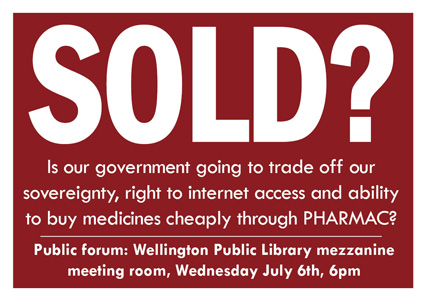The TPP Forum held in Wellington a week ago was a great success with over 130 people turning up to find out more about the Trans Pacific Partnership free trade agreement and what it means for New Zealand.
The speeches have now been uploaded to YouTube.
Jane Kelsey put the TPP in an international and historical context and talked about the impact it would have on New Zealanders.
Thomas Beagle from Tech Liberty gave a presentation on how the TPP was an attempt to circumvent New Zealand’s democracy in the formation of law around intellectual property.
Des O’Day, lecturer in health economics from Otago University, gave some background on Pharmac, how it worked to save New Zealand money, and how it would be at risk from the TPP. Due to technical difficulties Des’s presentation was not videoed.
